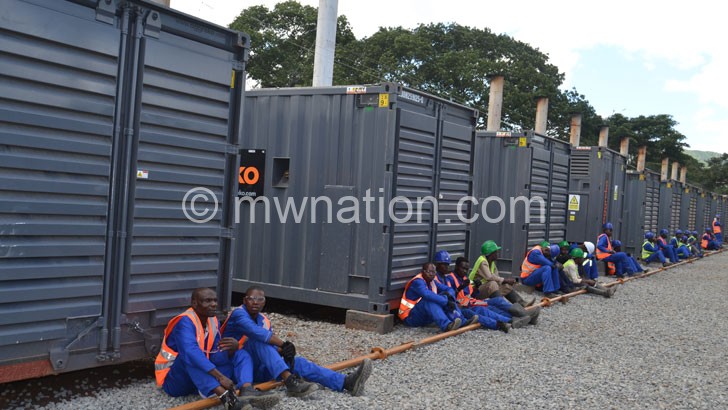Tonse renews genset deal
The Tonse Alliance administration has renewed the controversial generator-powered electricity deal with Aggreko Power Solutions for another two years, The Nation has learnt.
Ministry of Energy spokesperson Saidi Banda confirmed the contract renewal in an interview yesterday, but stressed that government’s intention is still to get rid of the generators “as soon as possible” when alternative electricity sources are found.

Said Banda: “The Minister [of Energy Newton Kambala] indicated that the ministry is not happy with the Aggreko diesel generators due to their high running costs as well as environmental impacts. The intention of the ministry is to get rid of the generators as soon as possible in an event that we have alternatives in place.
“As of now, the alternatives are not in place, as such, the contract has been renewed for another two years subject to review after one year. If the alternatives will be in place, then the gensets will not be relied upon.”
When the deal was first awarded in 2017, documents showed that it would cost Escom roughly K57 billion over the two-year period, a bill experts said at the time was unsustainable and could push electricity tariffs beyond the reach of the majority of Malawians.
Banda said under the renewed contract, the first year will run from January 2021 to December 2021 while the second year will span from January 2022 to December 2022.
He said the alternatives currently being explored as better substitutes to the diesel generators include the solar independent power producers (IPPs), interconnectors and as well as other power sources like coal and gas.
“Other initiatives being implemented are to do with energy efficiency to reduce demand or pressure in the grid. The initiatives, among others, include LEDs, solar geysers, and LPG [Liquefied Petroleum Gas] for cooking,” said Banda.
In January 2020, the Democratic Progressive Party (DPP) administration renewed the Aggreko contract for another year to January 2021.
In the deal, Aggreko—which is an IPP—is leasing 84 generators with a combined capacity of 78 megawatts (MW).
The generators are stationed at Chichiri in Blantyre (30MW), Kanengo in Lilongwe (25MW) and Chinyama in Kasungu (23MW).
Our sources within the energy sector yesterday corroborated that the three diesel-powered plants are consuming a combined 161 834.40 litres of diesel per day.
The breakdown is as follows: Chichiri plant (72 618 litres, Kanengo plant (41 494 litres) and Chinyama plant in Kasungu (47 720 litres).
Industry sources yesterday said Aggreko buys diesel from the National Oil Company of Malawi (Nocma) at the landed cost of the commodity minus all fuel levies, but plus wholesale margin which is less than the pump price of K826.40 per litre.
On her part, Malawi Energy Regulatory Authority (Mera) spokesperson FitinaKhonje yesterday said as the country works on long-term and sustainable solutions, it [the country] still needs to minimise existing power constraints.
She said the first Power Purchase Agreement (PPA) that was reviewed and renewed expires this month and that Mera had received a second application from Escom.
Commenting on the first renewal of the contract with Aggreko, Khonje said in a written response to our questionnaire: “Since the beginning of the initial Escom/Aggreko Power Purchase Agreement (PPA), there hasn’t been other substantive additional power to the grid. IPPs have not rolled out as planned. Of course, JMC Solar Power is expected to be online this year. However, we need more and something to fall back on.
“It should be noted that the initial PPA gave room for Escom, the buyer, to extend the service period of the PPA. After Escom and Aggreko negotiated and agreed on the extension, Mera reviewed and approved their PPA.”
But some stakeholders in the energy sector have criticised the contract renewal, saying the power deal is unreasonably expensive with little impact on addressing the country’s power challenges.
In an interview yesterday, Parliamentary Committee on Natural Resources and Climate Change chairperson WeraniChilenga described the extension of the project by the new administration as “unbelievable and unfortunate.”
He said: “This is unbelievable. I didn’t expect this to happen. It was the minister himself [Kambala] at one time who called me at Parliament, complaining that tariffs are high and he told me that they were looking for a replacement for this deal…It is very unfortunate as it means Malawians will continue to shoulder the high cost of this deal. As a committee, even with the previous government, we vehemently rejected this expensive deal.”
Speaking separately, former minister of Energy Grain Malunga hoped that government has renegotiated the contract.
“The old one [contract] was unsustainable and I expected us to have filled the energy gap it was filling by now,” he said in a telephone interview yesterday from India.
In a recent exclusive interview with The Nation, Kambala admitted that the deal was “very uneconomical”, but said Malawians would rather have expensive source of power than nothing.
He said: “Our hydro is giving us less than 400 megawatts of electricity when we have enough water, but when the water levels are low, sometimes we get less than 200 megawatts. But our demand is close to 400 megawatts. So, we cannot do without Aggreko at the moment and we will have to keep Aggreko as long as we don’t have a better substitute for us to replace Aggreko.
“So, as much as government is an aware that this is a bad deal, and they are very expensive, but their contract is expiring somewhere in January [2021].But if we don’t get somebody with a better solution to electricity, then we will have to renew their contract. I am sure the rest of Malawians would agree that we would rather pay more than have no power.”





